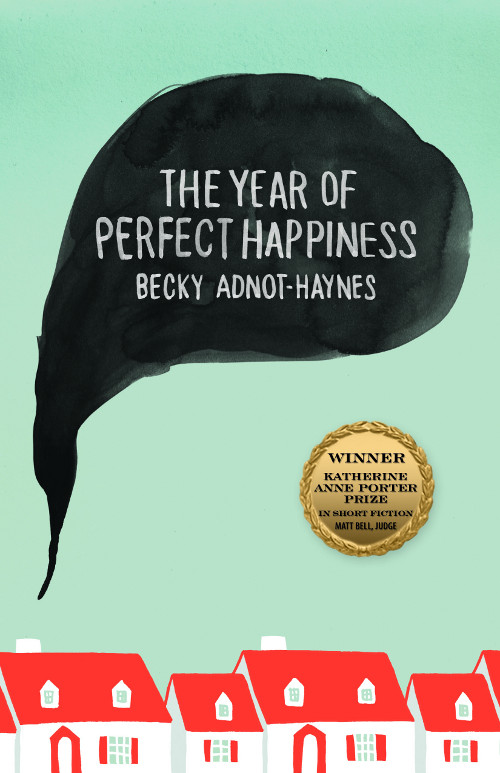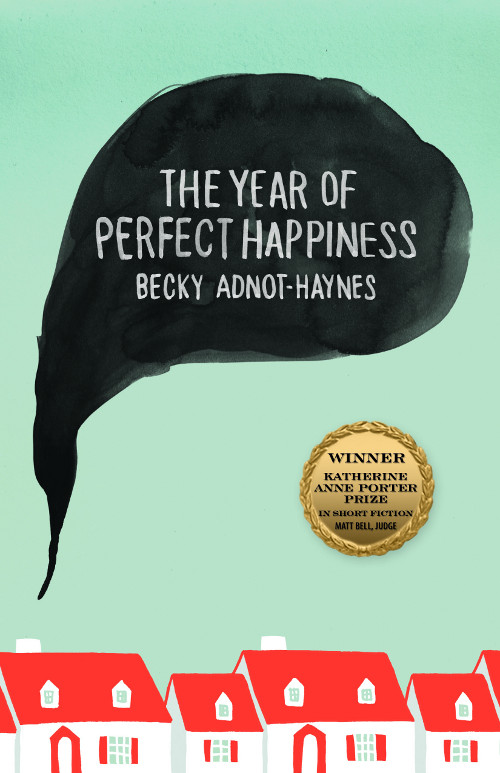
In this collection, winner of the Katherine Anne Porter Prize in Short Fiction, Adnot-Haynes mines the iffy world of early adulthood, where the players are constantly looking over their shoulders, about to be found out as imposters. The things they’re supposed to want—babies, mortgages, and stable, healthy relationships—aren’t what they really want at all, and it’s like a trip back through my twenties and early thirties watching how these characters self-sabotage their own best efforts at happiness. In “Baby Baby,” Mina, the protagonist, realizes, “It’s part of the reason why she agreed, after only six months of dating, to move to Tom’s city, to buy a house with him—the pressure of never having done anything in her adult life spreading through her like a cold.” Sometimes the need to appear adult is more important than actually making an adult decision.
The strength of Adnot-Haynes’ details and observations, and her ability to inhabit a character’s viewpoint and experience, are two of the true delights of this collection. In “A Natural Progression of Things,” a checkout clerk explains to his friend how he knows whether or not a customer will want paper or plastic:
“I get it right nine times out of ten,” he says. “No bullshit. It’s like, the more of a tight-ass somebody is, the more likely he’s gonna want paper, because plastic is small and it’s flimsy and it’s just not good enough for him. So I see a guy come through the checkout with pre-cut vegetables or frozen lasagnas—convenience food, you know?—and it’s like, I know he’s not gonna mind plastic because he’s cool, he doesn’t care about that sort of thing. But you see a lady yelling at her kids to be quiet and quit touching the candy bars, and it’s like you know she’s gonna want paper.”
All of this sounds accurate, but then Adnot-Haynes takes it a step further, and here is where she shows her real gift for observation:
He stops and considers this for a moment, an empty bun in his hands. He tears a strip of bread off slowly. “I guess that’s not exactly right,” he says. “If she’s yelling at her kids, she might say okay to plastic because she doesn’t have time to concern herself with what kind of grocery bag she’s getting. But if she’s whispering in their ears and gripping their arms and telling them to behave themselves in public, she’s paper for sure.”
While individually, the stories are very strong and the observations pristine, there is a repetition to them that wears a bit by the ends. The collection is populated by young women who eat frozen yogurt and think a lot about how they’re perceived. Most of the characters are heterosexual and middle class. Most of them only care how a relationship is working for them, with no heed for the partner who is also involved. In “The Men,” for instance, Addy breaks up with boyfriends just for the performance and drama, continuing to look for the shiny new relationship she can some day destroy. She’d be well-suited to date Davis the protagonist in “The Year of Perfect Happiness,” who spends a year trying to make himself happy, the next relationship in his self-centered wake just a city away.
In addition, there’s lots of lying in these stories—a woman tells her realtor she’s pregnant, then that she’s miscarried; another tells an Internet group she’s suffering from a terrible disease—and also much coming clean to their significant others about what they’ve done. What’s interesting is not the buildup of the lie, or even the surprise of the reveal, but the flatness of the response. What these characters seem to want more than anything is a reaction, yet they’re so busy worrying about themselves that no one seems to react to anyone else. In “Rough Like Wool,” a wife confesses her dishonesty to her husband, who has a quick flair of anger, and then they return to normal—the husband making a silent decision to put up with her terrible behavior, and she agreeing silently to remain terrible.
At times it feels that Adnot-Haynes doesn’t know how to stay in the terrible moments, to really address them; they feel like monsters peaking their heads out of the ocean only to submerge themselves again. And while the narrators of these stories recognize the characters’ shortcomings and sometimes treat them with respect, at other times the narrators also seem to look down on the characters, aware of their foibles and judging them for them. The humor is clear, but at times it still feels uncomfortably directed at the characters.
A story that goes against these patterns is “Planche, Whip, Salto,” where the main character starts taking Trapeze lessons on a whim, then ends up leaving her steady life to be a junior-level aerialist at trapeze school. This is so delightfully ridiculous, such a decidedly unexpected decision, that the reader is happy to see someone take action.
This is the second book by a University of Cincinnati graduate I’ve reviewed for Heavy Feather Review, and given the depth of the work and also the differences between the two books (the other is By Light We Knew Our Names by Anne Valente), I’d say exciting work is coming out of the program. And as much as I like this book, what I’m really looking forward to is the second or third book by Becky Adnot-Haynes, when she will see beyond her characters’ flaws and allow them to grow up a bit so she can access the true complication underneath their behavior.
The Year of Perfect Happiness, by Becky Adnot-Haynes. Denton, Texas: University of North Texas Press. 192 pages. $14.95, paper.
Erin Flanagan is the author of two short story collections published by the University of Nebraska Press: The Usual Mistakes (2005) and It’s Not Going to Kill You, and Other Stories (2013). Her fiction has appeared in Prairie Schooner, Colorado Review, The Missouri Review, The Connecticut Review, the Best New American Voices anthology series, and elsewhere. She’s held fellowships to Yaddo, The MacDowell Colony, the Sewanee and Bread Loaf Writers’ conferences, and this summer served as faculty at the Antioch Writers’ Workshop.
Check out HFR’s book catalog, publicity list, submission manager, and buy merch from our Spring store. Follow us on Instagram and YouTube. Disclosure: HFR is an affiliate of Bookshop.org and we will earn a commission if you click through and make a purchase. Sales from Bookshop.org help support independent bookstores and small presses.


Leave a comment